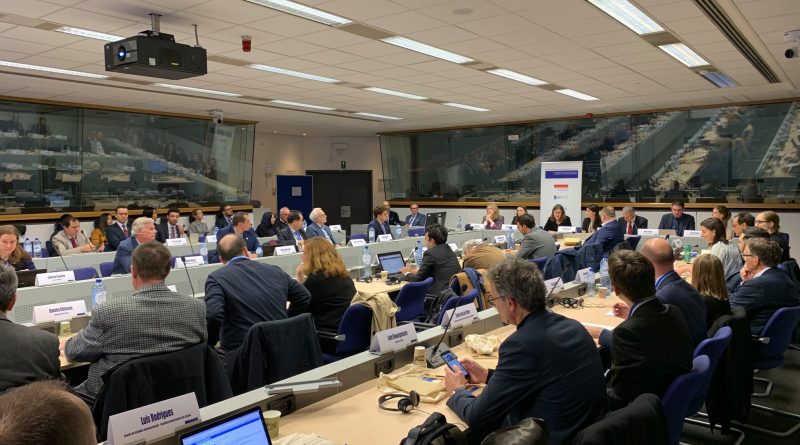2019 EU Non-Proliferation and Disarmament Conference: An Overview
The 2019 edition of the EU Non-Proliferation and Disarmament Conference took place in Brussels, on the 13th and 14th of December. As a member of the EU Non-Proliferation Consortium, the Centre for International Studies was invited to send representatives to attend the conference.
A challenging strategic environment
According to Ms. Izumi Nakamitsu, United Nations (UN) Under-Secretary-General, four major trends in the current security environment can be identified: 1) geostrategic context of distrust; 2) multipolarism; 3) new technologies; and 4) erosion of disarmament and non-proliferation instruments. Ms. Nakamitsu explained that the relations between great powers are presently marked by competition, which has had a negative impact on arms control, and denounced the occurrence of a qualitative arms race, as well as the articulation of dangerous rhetoric about the utility of nuclear weapons. As a result, not since the Cold War has the risk of nuclear weapons use been higher. Concurrently, technological developments have created new domains of warfare, as well as new vulnerabilities and problems of application (gaps) of international law. Ms. Nakamitsu described the EU as the “largest supporter of the Secretary-General’s agenda”, “one of the largest supporters of multilateralism”, and an “indispensable partner” to the UN on non-proliferation, disarmament and arms control.
The NATO representation, in a speech delivered by Eirini Maniati, brought to attention the spread of long-range missiles across Asia and the Middle East (involving both state and non-state actors), in addition to the demise of the INF (Intermediate Nuclear Forces) Treaty, for which Russia was declared to be of blame. Ms. Maniati considered unlikely that new major agreements would be celebrated in the current strategic environment, but stated that it was precisely during the current transitional period that it was important to redouble efforts to engage with all actors on arms control, particularly with China, in light of its lack of transparency.
American views on arms control: two approaches
Christopher Ford, representative of the U.S. State Department, emphasized the existence of two approaches to arms control: 1) the traditional approach; and 2) the normative approach. He described the first approach as prohibitory and regulatory, and based on distinctions such as legal/illegal, or compliance/non-compliance; essentially, pertaining to hard (binding) rules. The emphasis of his communication was placed on what he described as a “fluid, socially constituted approach”, however, which was related to the maintenance and establishment of (non-binding) norms and standards of responsible behavior, based on collective expectations instead of prohibitions. Mr. Ford argued that state and non-state pace of innovation leads to rapidly outdated regulations, and thus traditional approaches make less sense in certain domains, where technology often has a dual-use nature and verification is more challenging, such as: 1) cyber space; 2) outer space; 3) bioscience; 4) missile proliferation; and 5) conventionally armed drones. Mr. Ford highlighted the potential contribution of the normative approach over traditional arms control models to deal with militia activities in outer space, where the range of threats is growing “with certain countries having now made space into a warfighting domain, China and Russia specifically”.
Nonetheless, Mr. Ford claimed that his country remained committed to more traditional approaches to arms control whenever they advanced U.S., ally, and partner interests, where confidence of agreement enforcement and verification exists, and which include complying partners, “despite chronic violations of arms control agreements by the Russian Federation which unfortunately have so tragically led to the demise of the INF Treaty.” The U.S. representative described the U.S. as a “good friend of arms control and an opponent of bad arms control”, and explained that his country was bringing that attitude into future arms control efforts “in response to destabilizing expansion of Russian and Chinese nuclear capabilities which threaten to precipitate a new worldwide nuclear arms race.” In light of the importance, for the U.S., that nuclear arms control became adapted to such a modern strategic environment, the country was committed to the negotiation of a trilateral nuclear arms control agreement, involving both Russia and China, so that the impeding arms race could be forestalled. As such, the two approaches were not deemed mutually exclusive.
Russian views on arms control: an emphasis on legally binding instruments
Mikhail Ulyanov, representative of the Russian Ministry of Foreign Affairs, resented the anti-Russian sentiments expressed by Mr. Ford, and claimed that he considered the emphasis placed by the U.S. representation on normative approaches to be a step back, and conducive to the erosion of agreements. The Russian representative emphasized that Russia would stick to laws, not norms, as the former were a more solid approach to international cooperation. Mr. Ulyanov regretted U.S. actions pertaining to the testing of capabilities previously banned under the INF Treaty, which he accused of being prepared years in advance, and rejected U.S. accusations of Russian non-compliance with the treaty, described by Mr. Ulyanov as a “straight-jacket” hindering America’s projection of force. Mr. Ulyanov continued to criticize the United States by condemning its decision to withdraw from the JCPOA (Joint Comprehensive Plan of Action, commonly known as Iran’s nuclear deal), as well as its efforts to prevent other from implementing it.
The Russian representative also expressed his regret regarding the looming expiration of the New START and portrayed the U.S. “trilateral approach” as non-sensical and strange – if China were to be brought to the negotiations – he asked – then what about the United Kingdom and France? Therefore, Russia’s position was that Moscow and Washington should prioritize the extension of the New START Treaty (it expires in 2021 but can be extended for up to five additional years). Lastly, in spite of Russia’s support for American efforts in negotiating with North Korea on the issue of the peninsula’s denuclearization, the representative expressed his skepticism on any possible chance of success.
North Korea’s nuclear program
A later panel focused on North Korea’s nuclear program. Of immediate concern was North Korea’s warning of an unwelcomed “Christmas gift” to the United States. North Korea had imposed an end of the year deadline for the United States to make concessions in the stalled nuclear talks and, as the date loomed closer, there was speculation that Pyongyang’s current moratorium on nuclear and missile testing would be broken with an intercontinental ballistic missile test. According to Ms. Duyeon Kim, North Korea was currently “flipping the script” of the history of nuclear negotiations: while in the past North Korea had to take concrete steps towards de-nuclearization in order to be rewarded with concessions, now the country was making big demands (such as sanctions relief, or an end to U.S. military exercises in the region) before even beginning to consider de-nuclearization.
North Korea has been escalating rhetoric by issuing verbal threats, and increasing tensions through military demonstrations which, according to Ms. Kim serve two main purposes: 1) they pressure the United States to offer North Korea a deal in the latter’s terms, and 2) lay a foundation to further provocative actions. According to Mr. Andrei Lankov, it is time to be realistic: North Korea’s denuclearization will not happen, as the nuclear program is the regime’s only guarantee of survival. Therefore, the only solution to this issue is the negotiation of an arms control deal including a nuclear freeze or, ideally, dismantlement of North Korea’s nuclear facilities.
Final remarks
The non-proliferation and disarmament regime encompasses many different entities tackling a wide variety of threats, from weapons of mass destruction (nuclear, radiological, biological and chemical), to small arms and light weapons, mines and more. New technologies and its related challenges emerged as a recurring concern in different discussions, and were presented as an area of strategic opportunity for the EU. While the speakers at the final panel of the conference, which addressed the implementation of the EU’s agenda, emphasized that the EU was more “than a declaration-machine with money”, it remained clear that the EU should play a bigger role on strategic issues.
Further progress in the areas of security of the defense was needed within the EU, even though, unlike multilateralism, it was not in its DNA. As the 2020 Review Conference of the Treaty on the Non-Proliferation of Nuclear Weapons approaches, the EU has an important role to play as a bride-builder and champion of multilateralism, although it must overcome the difficulties faced at times in finding compromises on language between its member states.
![]() This work is licensed under a Creative Commons Attribution-NonCommercial-ShareAlike 4.0 International License.
This work is licensed under a Creative Commons Attribution-NonCommercial-ShareAlike 4.0 International License.




